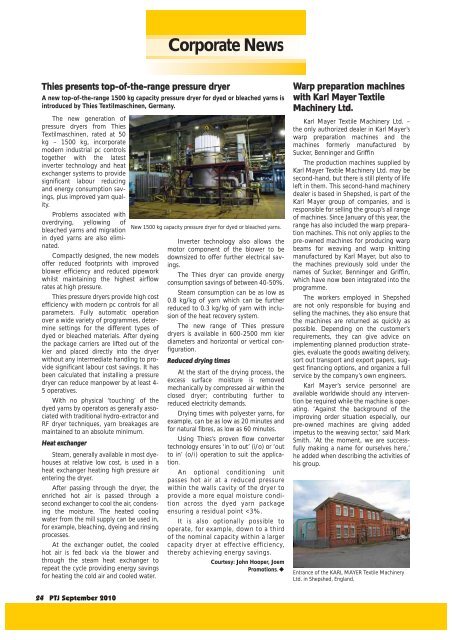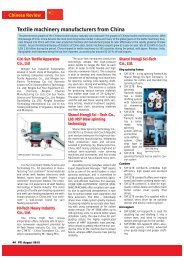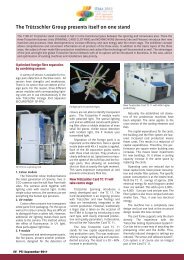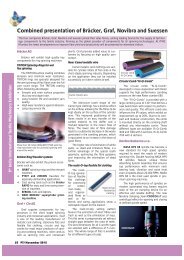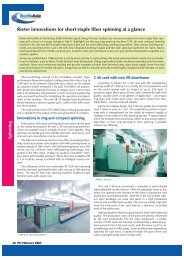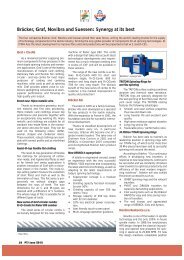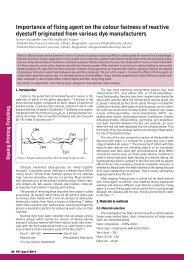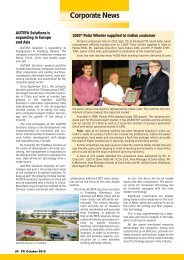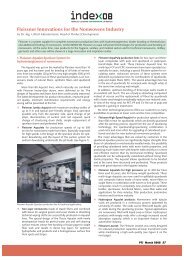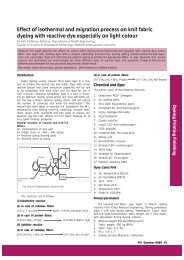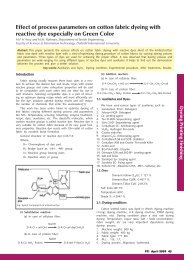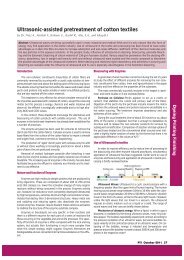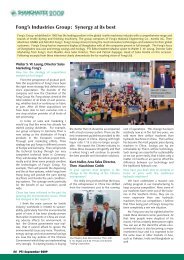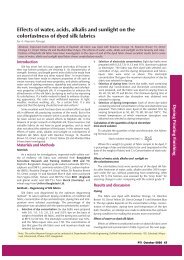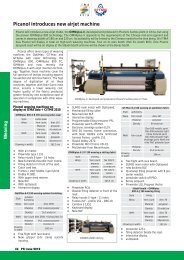Corporate News - Pakistan Textile Journal
Corporate News - Pakistan Textile Journal
Corporate News - Pakistan Textile Journal
Create successful ePaper yourself
Turn your PDF publications into a flip-book with our unique Google optimized e-Paper software.
The new generation of<br />
pressure dryers from Thies<br />
Textilmaschinen, rated at 50<br />
kg – 1500 kg, incorporate<br />
modern industrial pc controls<br />
together with the latest<br />
inverter technology and heat<br />
exchanger systems to provide<br />
significant labour reducing<br />
and energy consumption savings,<br />
plus improved yarn quality.<br />
Problems associated with<br />
overdrying, yellowing of<br />
bleached yarns and migration<br />
in dyed yarns are also eliminated.<br />
Compactly designed, the new models<br />
offer reduced footprints with improved<br />
blower efficiency and reduced pipework<br />
whilst maintaining the highest airflow<br />
rates at high pressure.<br />
Thies pressure dryers provide high cost<br />
efficiency with modern pc controls for all<br />
parameters. Fully automatic operation<br />
over a wide variety of programmes, determine<br />
settings for the different types of<br />
dyed or bleached materials. After dyeing<br />
the package carriers are lifted out of the<br />
kier and placed directly into the dryer<br />
without any intermediate handling to provide<br />
significant labour cost savings. It has<br />
been calculated that installing a pressure<br />
dryer can reduce manpower by at least 4-<br />
5 operatives.<br />
With no physical ‘touching’ of the<br />
dyed yarns by operators as generally associated<br />
with traditional hydro-extractor and<br />
RF dryer techniques, yarn breakages are<br />
maintained to an absolute minimum.<br />
Heat exchanger<br />
Steam, generally available in most dyehouses<br />
at relative low cost, is used in a<br />
heat exchanger heating high pressure air<br />
entering the dryer.<br />
After passing through the dryer, the<br />
enriched hot air is passed through a<br />
second exchanger to cool the air, condensing<br />
the moisture. The heated cooling<br />
water from the mill supply can be used in,<br />
for example, bleaching, dyeing and rinsing<br />
processes.<br />
At the exchanger outlet, the cooled<br />
hot air is fed back via the blower and<br />
through the steam heat exchanger to<br />
repeat the cycle providing energy savings<br />
for heating the cold air and cooled water.<br />
24 PTJ September 2010<br />
<strong>Corporate</strong> <strong>News</strong><br />
Thies presents top-of-the-range pressure dryer<br />
A new top-of-the-range 1500 kg capacity pressure dryer for dyed or bleached yarns is<br />
introduced by Thies Textilmaschinen, Germany.<br />
New 1500 kg capacity pressure dryer for dyed or bleached yarns.<br />
Inverter technology also allows the<br />
motor component of the blower to be<br />
downsized to offer further electrical savings.<br />
The Thies dryer can provide energy<br />
consumption savings of between 40-50%.<br />
Steam consumption can be as low as<br />
0.8 kg/kg of yarn which can be further<br />
reduced to 0.3 kg/kg of yarn with inclusion<br />
of the heat recovery system.<br />
The new range of Thies pressure<br />
dryers is available in 600-2500 mm kier<br />
diameters and horizontal or vertical configuration.<br />
Reduced drying times<br />
At the start of the drying process, the<br />
excess surface moisture is removed<br />
mechanically by compressed air within the<br />
closed dryer; contributing further to<br />
reduced electricity demands.<br />
Drying times with polyester yarns, for<br />
example, can be as low as 20 minutes and<br />
for natural fibres, as low as 60 minutes.<br />
Using Thies’s proven flow converter<br />
technology ensures ‘in to out’ (i/o) or ‘out<br />
to in’ (o/i) operation to suit the application.<br />
An optional conditioning unit<br />
passes hot air at a reduced pressure<br />
within the walls cavity of the dryer to<br />
provide a more equal moisture condition<br />
across the dyed yarn package<br />
ensuring a residual point
Oerlikon Barmag Service<br />
Shuttle - Truck on track<br />
Since March of this year, the Oerlikon<br />
Barmag Service Shuttle has been out and<br />
about on the streets of India. The red-andwhite<br />
vehicle transports machine parts<br />
requiring service from Oerlikon Barmag<br />
customers to the service station in Baroda<br />
and back.<br />
“We wanted to make the regular servicing<br />
process and the necessary repairs<br />
easier for our customers. The idea was to<br />
make it faster and more comfortable,<br />
which is why we introduced this new service”,<br />
explains Ramakant Katre, Head of<br />
the Oerlikon Barmag Service Station<br />
Baroda, commenting on setting up the<br />
innovative Service Shuttle. And the fact<br />
that this was a great idea has been confirmed<br />
in the first four months following its<br />
launch: the service truck has already traveled<br />
more than 10,000 kilometers in the<br />
first 18 weeks since being commissioned.<br />
Customer support expanded by<br />
consulting<br />
Oerlikon Barmag maintains a service<br />
station in Baroda, India, for 15 years, herewith<br />
acting upon the company's maxim to<br />
be nearby its customers.<br />
Oerlikon Barmag Service Station in<br />
Baroda has been offering intensive consulting<br />
services for its customers with<br />
regard to production processes.<br />
During the two- to three-day visits,<br />
process, electrical and mechanical engineers<br />
check the customers’ facilities from<br />
the ground up. Following this, the<br />
Oerlikon <strong>Textile</strong> India specialists provide<br />
information on how to improve<br />
processes, on how to increase productivity<br />
and on how to maintain and service<br />
the systems.<br />
Oerlikon Barmag’s Service Manager,<br />
Marcel Bornheim, has a positive outlook<br />
for the service: “Ten customers have<br />
already received reports on how they can<br />
achieve improvements to their systems<br />
and operations. We achieve the best<br />
results through the intensive collaboration<br />
with, and by, our customers’ managements,<br />
production heads and the<br />
maintenance units.”<br />
The new service has clearly hit the<br />
mark as the next ten customer visits have<br />
already been scheduled.<br />
Oerlikon Barmag is the world market<br />
leader for spinning systems and equipment<br />
for manmade fibers and texturing<br />
machines and – as a service provider –<br />
offers engineering solutions for the entire<br />
textile value added chain.<br />
<strong>Corporate</strong> <strong>News</strong><br />
NSC nonwoven and Freudenberg Politex: partners on<br />
needlepunching technology<br />
Freudenberg Politex from<br />
Colmar (France) is specialized in<br />
roofing sector and technical<br />
products using short fibres and<br />
spunbond process. This facility<br />
integrated in the Freudenberg<br />
Politex Group in 1997 has contracted<br />
NSC Nonwoven to provide<br />
their equipment for a A.50<br />
RS Asselin ® needleloom replacing<br />
a previous generation of<br />
A.25 Asselin ® needleloom for<br />
spunbond application.<br />
The decision to purchase<br />
NSC equipment has been taken<br />
due to innovative solutions<br />
Freudenberg Politex A 50 RS<br />
needleloom.<br />
More than 125 members of the Turkish<br />
cotton community attended a ‘Cotton<br />
Trade Information Summit’ at the<br />
Kahramanmaras Chamber of Industry and<br />
Trade on 28 June 2010. Taking the form of<br />
a workshop and an open forum session, the<br />
event was organised by KASIAD -<br />
Kahramanmaras Business Trade<br />
Community and hosted by the International<br />
Cotton Association (ICA).<br />
Designed to engage and hear the<br />
views of the local cotton community and<br />
help generate a greater understanding of<br />
the principles of contract sanctity, ICA<br />
Rules and arbitration procedures, the<br />
event was open to both ICA members<br />
and non-members and it was free to<br />
attend.<br />
ICA Director and Vice President of<br />
Ensar Tekstil, Ertugrul Tanriverdi highlighted<br />
the fact that cotton production in<br />
Turkey does not meet consumption:<br />
“Last year, our production was<br />
1,800,000 bales and consumption was<br />
5,600,000,” he explained. “If we calculate<br />
the difference in volume, it is about<br />
$1.5 billion dollars shortfall. We currently<br />
have just four Turkish firms who are<br />
members of the ICA. I believe we should<br />
definitely increase participation.”<br />
Abdulkadir Kurtul, president of<br />
KASIAD, said, “We really do not have<br />
any problem with consumption,” he<br />
said. “This shows our leadership in the<br />
textile business. But our country should<br />
be at a balance between production and<br />
consumption. The cotton is a strategic<br />
product, therefore production problems<br />
must be solved if the voice of Turkish<br />
cotton producers is to be heard.”<br />
ICA President, Cliff White and ICA<br />
Managing Director, Kai Hughes went on<br />
enabling needlelooms to run at<br />
a high production speed with<br />
continuous advance. The productivity<br />
and reliability of the<br />
equipment are then significantly<br />
increased.<br />
Freudenberg Politex operates<br />
out of seven production<br />
sites: three in Italy, one in<br />
Russia, one in the United<br />
States, one in Poland and<br />
finally one in France where<br />
NSC nonwoven partnership is<br />
well installed as all the lines are<br />
equipped with Asselin ®<br />
needlelooms.<br />
ICA hosts successful trade information summit in Turkey<br />
ICA President, Cliff White (right) and ICA<br />
Director Ertugrul Tanriverdi take questions<br />
from the floor.<br />
More than 125 members of the Turkish cotton<br />
community attended the ICA Cotton Trade<br />
Information Summit.<br />
Delegates focus on the presentations.<br />
to deliver presentations that focused on<br />
the trading rules, contract agreements,<br />
arbitration and dispute resolution.<br />
During the open forum session, they<br />
took questions from the floor and reinforced<br />
the message that ICA Rules are<br />
not designed to limit trade - they serve as<br />
a guideline for the trade and are the basis<br />
of contract agreements.<br />
PTJ September 2010 25
The progress of Ho Chi Minh yarn<br />
spinner Thien Nam, which marks its tenth<br />
anniversary in 2010, has been rapid – with<br />
strong backing from Trützschler’s local<br />
team. The growth of Ho Chi Minh-headquartered<br />
Thien Nam in just ten years<br />
serves as a perfect example of the progress<br />
of the privately-run Vietnamese textile<br />
industry since 2000. This was the year of<br />
the spinning company’s formation, and<br />
one thing it quickly learned in the early<br />
days was the vital role of good fibre preparation<br />
for yarn quality.<br />
“Our first plant was<br />
fitted with Far Eastern<br />
machines purchased<br />
solely because they were<br />
the cheapest, which we<br />
soon discovered was not<br />
enough,” said Vice<br />
General Director Tran Le<br />
Ha. “As a consequence,<br />
both of the new plants we have subsequently<br />
built are fitted with Trützschler fibre preparation<br />
machinery and cards; ordered through<br />
the local agent Tri-Union Management.”<br />
The company started out with 24,000<br />
spindles, at a time when much of the country’s<br />
textile industry was still run by the government<br />
within domestically-focused Vinatex<br />
organisation.<br />
“At that time, obtaining finance was very<br />
difficult and yarn spinning requires more initial<br />
capital investment than most others in<br />
Vietnam,” remembers Vice General Director<br />
Tran Le Ha, who has been involved in the<br />
company’s progress from the outset with<br />
General Director Tran Dang Tuong. “Before<br />
2000 we were simply a trading business, with<br />
no experience of spinning and no reliable<br />
engineers at that time – even our established<br />
customers were wary of our ability to produce<br />
our own yarn.”<br />
Nevertheless, a combination of determination<br />
and recruitment of the right people<br />
soon saw the company taking<br />
off, to the extent that over the<br />
past five years, it has been in a<br />
position to build a second purpose-built<br />
spinning plant – considerably<br />
bigger than the first<br />
with 38,000 spindles – followed<br />
by, a third with 40,000 spindles.<br />
26 PTJ September 2010<br />
<strong>Corporate</strong> <strong>News</strong><br />
Ho Chi Minh yarn spinner Thien Nam celebrates 10 th<br />
anniversary with Trützschler<br />
“In general, successful spinning is about<br />
finding the optimum balance between high<br />
production and high productivity, depending<br />
on the performance of the machines,” said<br />
Mr Ha. “So on the Chinese cards in the first<br />
plant, we run polyester at 20kg of fibre per<br />
hour to achieve the quality required. On the<br />
Trützschler machines, we run the same fibre<br />
at 80 kg per hour, which says it all.”<br />
Thien Nan’s Plant Number 2 features 16<br />
Trützschler TC03 cards, and plant Number 3<br />
18, with both units equipped with Trützschler<br />
baling, opening, blending and feeding units<br />
for cotton, polyester and viscose. Trützschler<br />
TC card lengths are considerably longer than<br />
conventional machines, to provide perfectly<br />
aligned fibres in a razor-thin, continuous fibre<br />
web which is formed into a sliver at the delivery<br />
side. This sliver is then delivered to transport<br />
cans for evening-out in the drawframe.<br />
“The Trützschler cards are very economical<br />
in terms of productivity, but also easy for maintenance<br />
and in respect of electricity usage and<br />
spares,” said Mr Ha. “But just as important is<br />
the service from Trützschler, which is very good<br />
compared to other companies.”<br />
“If there is any quality issue at all, we are<br />
there to help, confirms KS Umesh, a technologist<br />
with the five-man Trützschler Service<br />
Station in Vietnam, which supplies complete<br />
back for around 450 Trützschler carding units<br />
and 120 drawframes, as well as other equipment<br />
now in place at plants across Vietnam –<br />
around 90% of all carding systems to have<br />
been installed in the country over the past 10<br />
years. “There is still a lack of experience here<br />
in Vietnam because the private industry is<br />
comparatively new, and the workforce is also<br />
generally young.”<br />
Thien Nam imports its cotton primarily<br />
from West Africa, as well as some from the<br />
USA and Uzbekistan, with Trützschler<br />
Blendomat units ensuring the correct feed of<br />
the cotton, viscose and polyester at the latest<br />
two plants. The major<br />
markets for the company’s<br />
yarn are Turkey,<br />
Korea, Malaysia and<br />
Japan, and with its<br />
102,000 spindles, the<br />
company’s annual<br />
capacity is now over<br />
16,000 tons. �<br />
Protective suit specialist TST<br />
signed a licensing agreement<br />
with DSM Dyneema<br />
Protective suit specialist TST Sweden has<br />
signed a licensing agreement with fiber manufacturer<br />
DSM Dyneema that will enable<br />
them to use the Dutch company’s distinctive<br />
trademark on their multilayer water-jet protective<br />
suits made with the ultra-high molecular<br />
weight polyethylene Dyneema ® fiber.<br />
Dyneema ® is not only the strongest material,<br />
but also the lightest, to be used in suits to protect<br />
operators using water jets operating at up<br />
to 2000 bar in hydro demolition and water<br />
blasting applications. The combination of<br />
high strength and low weight provides an<br />
unmatched level of comfort for the operator.<br />
TSTs multilayer water-jet protective suits made<br />
with Dyneema ® .<br />
Dyneema ® fibers are already widely used<br />
in the production of high performance cutresistant<br />
gloves. TST Sweden is the first company<br />
to use them to make protective suits<br />
and to receive a license to use the Dyneema ®<br />
brand. The suits, developed in a collaborative<br />
project by TST together with the Swedish<br />
research institute Swerea, and supported by<br />
DSM Dyneema, are radically different from<br />
competing suits that are made up from interlinked<br />
rigid panels in a monolayer structure.<br />
Instead, the TST suits comprise several layers<br />
of flexible fabric, with inner layers of<br />
Dyneema ® fiber sandwiched between outer<br />
layers of a nylon fabric. Here, the level of protection<br />
can be adjusted by varying the<br />
number of layers of Dyneema ® used in any<br />
particular suit.<br />
This means that TST suits can be tailored<br />
to the exact protection level required for any<br />
particular type of work. Competing suits are<br />
only available at the higher levels of protection<br />
of 2,000 bar, which means for many<br />
water-jet uses traditional suits are over-specified.<br />
TST suits made with Dyneema ® now<br />
enable tailormade suits that are precisely fitfor-purpose<br />
in terms of the protection level<br />
required, thereby also optimizing wearer<br />
comfort and maneuverability. A further<br />
advantage of the suits made with Dyneema ®<br />
is that they are easy to wash.
Univar expands in the Baltics<br />
with a new office<br />
Univar is one of the leading distributors<br />
of industrial and specialty chemicals.<br />
Univar represents over 2,500 chemical<br />
producers and provides its customer<br />
base, made up of 80,000 customers, with<br />
a full portfolio of products.<br />
Univar has signed a distribution deal<br />
with Celanese Emulsion Polymers, a<br />
leader in emulsion technology and application<br />
development. The agreement<br />
establishes Univar’s position in the Baltic<br />
region following the recent opening of its<br />
office in Lithuania.<br />
Under this new agreement, Univar will<br />
distribute Celanese Emulsion products to<br />
the coatings, adhesives, nonwovens, glass<br />
fibers, textiles, paper and construction<br />
industries. Celanese offers one of the<br />
broadest and most comprehensive portfolios<br />
of waterborne emulsions in the world<br />
and is a leading producer of vinyl-based<br />
emulsions globally.<br />
The company also announced<br />
appointment of Sales Manager, Gintaras<br />
Sabonis, who will manage Univar’s Baltic<br />
business out of the new Lithuanian<br />
office. He will be responsible for developing<br />
Univar’s business in Lithuania, Latvia<br />
and Estonia, covering a wide range of<br />
industries including pharmaceutical, personal<br />
care, coatings, construction, food,<br />
energy and refinery.<br />
“The Baltic region is very exciting<br />
with a lot of great opportunities for<br />
Univar. Our agreement with Celanese is<br />
in response to increasing demand for<br />
innovative and sustainable technologies,<br />
and Celanese will be a valued partner in<br />
our efforts to continuously deliver cutting-edge<br />
products to our extensive customer<br />
base across the region,” explains<br />
Ola Tengroth, Regional Director for<br />
Nordics and Baltic Region. “Gintaras’<br />
solid background in the Baltic and pan-<br />
European chemicals industries makes him<br />
the right person to lead our business in<br />
the Baltics, and with him at the helm we<br />
will be equipped with the talent, network<br />
and expertise to achieve our goals in this<br />
budding region.”<br />
“With the appointment of Univar, we<br />
found a partner with deep knowledge of<br />
and expertise in this region,” says<br />
Michael Sauer, Regional Sales Manager<br />
Eastern Europe, Celanese Emulsions. “In<br />
addition, Celanese has a strong focus on<br />
innovation and sustainability and it is<br />
important that our partners share this<br />
commitment.”<br />
Univar’s strong sales and marketing<br />
teams complement chemical producers<br />
<strong>Corporate</strong> <strong>News</strong><br />
and create value for customers. The company<br />
provides technical expertise in<br />
application development, excellence in<br />
logistics support, and outstanding customer<br />
service to help its partners grow<br />
their business.<br />
AVM Chemical Industries<br />
receives Brand of the<br />
year award<br />
Brands are recognized to be the most<br />
valuable asset of any company and in<br />
many cases considered as the single most<br />
valuable asset. In the early 1980's the<br />
intangible elements (goodwill or brand<br />
equity) that made up to the total market<br />
value of 100 fortune brands was on average<br />
around 40%; but today it is more<br />
than 70%. (Reported by Economic<br />
Watch International).<br />
Today, the brand - whether in the<br />
corporate, services, product or not-forprofit<br />
sector is the most important asset.<br />
It is a proven fact that more than one<br />
third of the world's wealth can be<br />
accounted for by brands.<br />
Mr. Sohail Tiki, Director of AVM Industries<br />
receiving the award from Prime Minister of<br />
<strong>Pakistan</strong>, Syed Yousuf Raza Gilani.<br />
In 2009, Management of Brand<br />
Award Council have received 550 nominations<br />
of individual brands in 176 different<br />
categories. Amongst 550 contenders<br />
in 2009, 153 brands were identified as<br />
Brands of the Year & 23 brands acknowledged<br />
as Emerging Brands<br />
AVM Chemical Industries is one of<br />
the leading chemical manufacturing<br />
company was awarded the brand of the<br />
year award.<br />
Mr. Muhammad Sohail Tiki, Director<br />
of AVM Chemical Industries, had an<br />
honor to receive brand award for the<br />
year 2009, by Prime Minster of <strong>Pakistan</strong>,<br />
Syed Yousuf Raza Gilani, on 7th May<br />
2010 at Governor House Karachi.<br />
Prime Minister encouraged and<br />
lauded the performance of the AVM<br />
Chemical Industries to achieve this award<br />
for quality.<br />
Change of registered office<br />
Picanol NV / Proferro NV<br />
Picanol NV and Proferro NV will<br />
move to their registered office. The new<br />
address is given as under:<br />
Picanol NV/Proferro NV<br />
Karel Steverlyncklaan 13<br />
BE-8900 Ypres, Belgium.<br />
The address and invoicing address<br />
will be the same, as well as telephone,<br />
fax and mail data shall remain<br />
unchanged.<br />
PSYMA delegation met<br />
Federal Advisor <strong>Textile</strong>s<br />
A 16 members delegation of <strong>Pakistan</strong><br />
Silk Yarn Merchants Association<br />
(PSYMA) met Federal Advisor on<br />
<strong>Textile</strong>s, Dr Mirza Ikhtiar Baig and discussed<br />
withdrawal of anti-dumping and<br />
custom duty on polyester yarn to<br />
improve the supply of man-made yarn.<br />
There are only two to three local<br />
companies are manufacturing polyester<br />
yarn in <strong>Pakistan</strong> and to have the monopoly<br />
they have managed anti-dumping<br />
and custom duty ranging from 3% to<br />
21% on the imports of polyester yarn<br />
mainly from Thailand and Korea. This has<br />
affected the growth in the use of polyester<br />
yarn in the value added textile<br />
sector and heavy reliance on 100%<br />
cotton yarn.<br />
The members also attributed present<br />
yarn crises due to government’s restricting<br />
import of polyester yarn for value<br />
added sector by imposing higher tariff.<br />
The competing countries use equal proporation<br />
of polyester yarn and cotton<br />
yarn, whereas in our country, use of<br />
polyester yarn is only 23% and the rest<br />
of 77% is cotton yarn. Dr Baig informed<br />
that he has already taken this matter<br />
with the Federal Minister and Secretary<br />
Commerce and Chairman and Member<br />
Customs FBR and recommended them<br />
them to withdraw anti-dumping and<br />
custom duty on import of polyester yarn<br />
to bridge the gap of demand and supply<br />
of yarn in the country. Dr Baig advised<br />
PSYMA members to apply for review<br />
petition to remove anti-dumping and<br />
custom duty on import of polyester yarn.<br />
Prominent members attended the<br />
meeting; Abdullah Hameed of Habib<br />
Silk, Hanif Lakhany of Qasimi Industries,<br />
Anwer Aziz of Iqbal Silk Mills, Nasir<br />
Hayat Magoon of Al Riaz, Shafquat<br />
Amin of Sohni Weaving and Mohammad<br />
Tanveer of Nigar Fabrics. �<br />
PTJ September 2010 27


